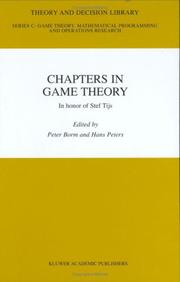| Listing 1 - 2 of 2 |
Sort by
|
Book
ISBN: 1281242012 9786611242015 354077954X 3540779531 364209676X 9783540779537 Year: 2008 Publisher: New York: Springer,
Abstract | Keywords | Export | Availability | Bookmark
 Loading...
Loading...Choose an application
- Reference Manager
- EndNote
- RefWorks (Direct export to RefWorks)
Cooperative game theory is a booming research area with many new developments in the last few years. So, our main purpose when preparing the second edition was to incorporate as much of these new developments as possible without changing the structure of the book. First, this offered us the opportunity to enhance and expand the treatment of traditional cooperative games, called here crisp games, and, especially, that of multi-choice games, in the idea to make the three parts of the monograph more balanced. Second, we have used the opportunity of a second edition to update and enlarge the list of references regarding the three models of cooperative games. Finally, we have benefited from this opportunity by removing typos and a few less important results from the first edition of the book, and by slightly polishing the English style and the punctuation, for the sake of consistency along the monograph. The main changes are: (1) Chapter 3 contains an additional section, Section 3. 3, on the average lexicographic value, which is a recent one-point solution concept defined on the class of balanced crisp games. (2) Chapter 4 is new. It offers a brief overview on solution concepts for crisp games from the point of view of egalitarian criteria, and presents in Section 4. 2 a recent set-valued solution concept based on egalitarian considerations, namely the equal split-o? set. (3)Chapter 5 is basically an enlarged version of Chapter 4 of the first edition because Section 5. 4 dealing with the relation between convex games and clan games with crisp coalitions is new.
Fuzzy sets. --- Game theory. --- Games, Theory of --- Theory of games --- Mathematical models --- Mathematics --- Sets, Fuzzy --- Fuzzy mathematics --- Set theory --- Economic theory. --- Mathematics. --- Operations research. --- Microeconomics. --- Economic Theory/Quantitative Economics/Mathematical Methods. --- Game Theory, Economics, Social and Behav. Sciences. --- Operations Research/Decision Theory. --- Operations Research, Management Science. --- Price theory --- Economics --- Operational analysis --- Operational research --- Industrial engineering --- Management science --- Research --- System theory --- Math --- Science --- Economic theory --- Political economy --- Social sciences --- Economic man --- Decision making. --- Management science. --- Quantitative business analysis --- Management --- Problem solving --- Operations research --- Statistical decision --- Deciding --- Decision (Psychology) --- Decision analysis --- Decision processes --- Making decisions --- Management decisions --- Choice (Psychology) --- Decision making --- Game theory

ISBN: 1402070632 9786610200139 1280200138 030647526X 9781402070631 Year: 2002 Volume: 31 Publisher: Boston: Kluwer,
Abstract | Keywords | Export | Availability | Bookmark
 Loading...
Loading...Choose an application
- Reference Manager
- EndNote
- RefWorks (Direct export to RefWorks)
Chapters in Game Theory has been written on the occasion of the 65th birthday of Stef Tijs, who can be regarded as the godfather of game theory in the Netherlands. The contributors all are indebted to Stef Tijs, as former Ph.D. students or otherwise. The book contains fourteen chapters on a wide range of subjects. Some of these can be considered surveys while other chapters present new results: most contributions can be positioned somewhere in between these categories. The topics covered include: cooperative stochastic games; noncooperative stochastic games; sequencing games; games arising form linear (semi-) infinite programming problems; network formation, costs and potential games; potentials and consistency in transferable utility games; the nucleolus and equilibrium prices; population uncertainty and equilibrium selection; cost sharing; centrality in social networks; extreme points of the core; equilibrium sets of bimatrix games; game theory and the market; and transfer procedures for nontransferable utility games. Both editors did their Ph.D with Stef Tijs, while he was affiliated with the mathematics department of the University of Nijmegen.
Game theory --- Jeux [Théorie des ] --- Speltheorie --- Théorie des jeux --- Business & Economics --- Mathematics --- Physical Sciences & Mathematics --- Economic Theory --- Algebra --- Economic theory. --- Microeconomics. --- Operations research. --- Decision making. --- Economic Theory/Quantitative Economics/Mathematical Methods. --- Operations Research/Decision Theory. --- Deciding --- Decision (Psychology) --- Decision analysis --- Decision processes --- Making decisions --- Management --- Management decisions --- Choice (Psychology) --- Problem solving --- Operational analysis --- Operational research --- Industrial engineering --- Management science --- Research --- System theory --- Price theory --- Economics --- Economic theory --- Political economy --- Social sciences --- Economic man --- Decision making --- Game theory. --- Games, Theory of --- Theory of games --- Mathematical models
| Listing 1 - 2 of 2 |
Sort by
|

 Search
Search Feedback
Feedback About UniCat
About UniCat  Help
Help News
News